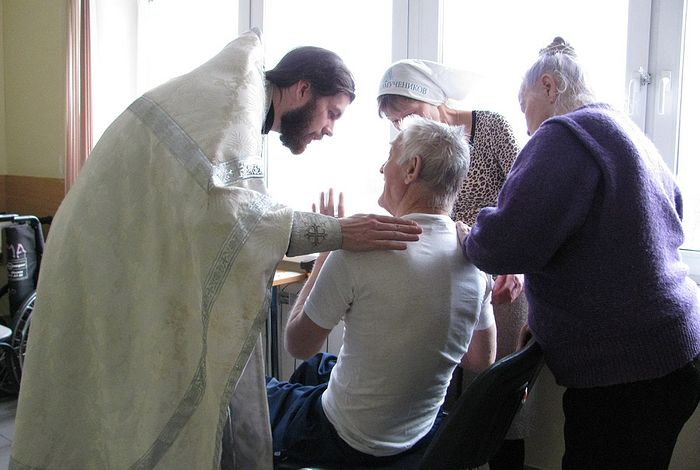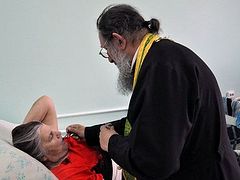“I won’t go to the hospital, not for the world! The Church heals me,” a woman, whose mental state worries everyone who knew her, told me. Without observing positive dynamics, I advised her to contact a specialist:
“Let the doctor see you and give his diagnosis.”
The woman refused. Some of her relatives suspected that this is what they teach in the Church. They came and asked me about it, and I answered that the Old Testament sends a sick person to the doctor after reminding him of the need to pray to God and abandon sin. The book called Sirach says much about the benefits of the medical profession, since the Lord created doctor doctor and gave him his work (cf. Sir. 38:1). Her kin relented and left, trying to guess at other possible reasons for rejecting medicine.
But it took me some time to understand that sometimes the Old Testament is not in favor with the Orthodox, and the Apostle Paul's words to the Colossians: Luke, the beloved physician, and Demas, greet you (Col. 4:14) do not particularly impress opponents of official medicine. Neither do the words of Christ, quoted by the Evangelist Matthew, that They that be whole need not a physician, but they that are sick (Mt. 9:12).
But where did this rejection of medicine come from? Is it really the notorious conflict between science and religion, which is so talked about in a secular society? Is it the fanaticism and obscurantism of religious people?
Here I deem it necessary to note that not all of my former fellow students at the Medical Academy got excellent grades. I personally know doctors who themselves receive treatment only from colleagues they know for sure to be competent. Medicine is a developing science. Certain methods of treatment are eventually recognized as inappropriate, and certain medicines that are accepted at one time are prohibited later. And one or another doctor, because of negligence or incompetence, now and then cures his patients to death. Distrust gradually accumulates and sometimes results in rejection.
And so Orthodox Christians come to a priest in whom the level of people's trust is quite high. And they ask him:
“Should I have an operation or will it heal itself?”
“Should I get vaccinated or not?”
“What about hormones? Some still say that HIV is a fiction! Maybe it’s better not to be treated after all?”
“What do you think about homeopathy, iridology and kinesiology?”
And sometimes the priest has never even heard of these things. We don’t study medicine in theological schools. No seminaries prepare the future pastors for the job of healing or divination. But there are on occasion priests who, despite a total lack of medical education, boldly answers these questions, as if he were Dr. House or a holy visionary who has already reached the gates of the Heavenly Kingdom.
I am personally not afraid to admit to parishioners that I do not have sufficient knowledge in medicine and recommend that they find a good specialist for medical consultation, diagnosis, and treatment. But what if I actually know something?
“Father, so what do you think of vaccinations?”
“You know, a notable immunologist of our city believes that the effects of vaccination are ephemeral, but the harm is obvious. And another, also well-known doctor, hold the diametrically opinon,” I reply.
“And do you get vaccinated yourself?”
“I don’t, because I find the arguments of the first specialist more convincing.”
No playing Nostradamus or Pythian oracles.
Can we rely on the omnipotence of medicine and a particular doctor? No, because no one is immune from mistakes. Should we trust in God alone, rejecting the help of doctors? But the Holy Scriptures say: Then give place to the physician, for the Lord hath created him: let him not go from thee, for thou hast need of him (Sir. 38:12). I would like to remind those who object to the study of the Old Testament, especially its non-canonical books, that Sts. John of Damascus and Athanasius of Alexandria, following Canon 85 of the Apostles, recommended this book for young men and catechumens preparing for Holy Baptism. The following question may be fair: If it is in the Bible, then why are there so many cases when a doctor is good and a medicine is new, but a patient gets worse and worse? There is a time when in their hands there is good success. For they shall also pray unto the Lord, that he would prosper that, which they give for ease and remedy to prolong life (Sir. 38:13-14), Jesus the son of Sirach teaches us.
They pray for their patients.
That is why St. Panteleimon was more successful than other doctors in the capital. Do not forget about the prayer of faith that saves the sick, about which James the Apostle reminds us. After all, Except the Lord build the house, they labour in vain that build it: except the Lord keep the city, the watchman waketh but in vain (cf. Ps. 126:1), testifies the Psalmist, who prayed to God and put watchmen on the city walls, and not just anyone, but the best ones.




